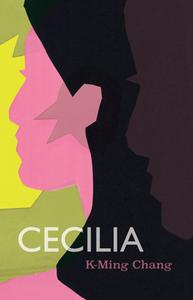
 Cecilia, by the critically acclaimed novelist and short story writer K-Ming Chang (Bestiary; Gods of Want; Organ Meats), is a sensual and surreal novella about the intensity, eroticism, and haunting nature of girlhood friendships.
Cecilia, by the critically acclaimed novelist and short story writer K-Ming Chang (Bestiary; Gods of Want; Organ Meats), is a sensual and surreal novella about the intensity, eroticism, and haunting nature of girlhood friendships.
As a cleaner at a chiropractic office, Seven is used to the indecencies of the human body and passes her time trying to "solve the mystery of the sheets on the gyrating table," falling into daytime imaginings to distract herself from reality. But when a chance meeting throws Seven and her childhood friend Cecilia back together, Seven's daydreaming begins to spin out of control, taking her back to memories and imaginings from her girlhood. As Seven and Cecilia orbit each other in the present, boarding the same bus seemingly without intention, the past increasingly bleeds through, unspooling desires Seven long made dormant.
Like Chang's previous work, Cecilia luxuriates in its visceral imagery of embodied desire. With descriptions like "one thumb beneath my shirt, the tip of it filling my belly button, burrowing until I bleed," and the scene of a young girl swallowing a liver that "pulses sour against my lips, blood lunging through it... [when] it slides down my throat," Chang never shies away from the raw. The writing borders on body horror, yet avoids becoming too grotesque. Instead, it allows space for readers to engage in a fascination with hunger, a transportive understanding of impulse. It attempts to capture the elusive view that Seven imagines a fly on her tongue might see down her throat, "at the threshold of my hunger."
Seven and Cecilia's journey together--both in the past and the present--escalates alongside the intensity of these descriptions. Rather than dismissing the eroticism of girlhood friendships as temporary, the unbound nature of Cecilia's time demands an acknowledgement of the more subversive nature of young sexual exploration. The tension of Cecilia and Seven's relationship--of what can be done but what shouldn't, of what they want but often fear--is the driving force behind the novella's pace. But the true wonder of the book is the precariousness with which it navigates tones, moving from dread to humor, longing to rage. As readers witness this high-wire act of affect and desire, realization and devastation, they will be compelled by, if nothing else, the knife's edge that underlines the novella's plot, always threatening a fresh cut. --Alice Martin, freelance writer and editor
Shelf Talker: A phantasmagoric journey of a body's awakening, Cecilia is a quick yet explosive read about queer desire.

